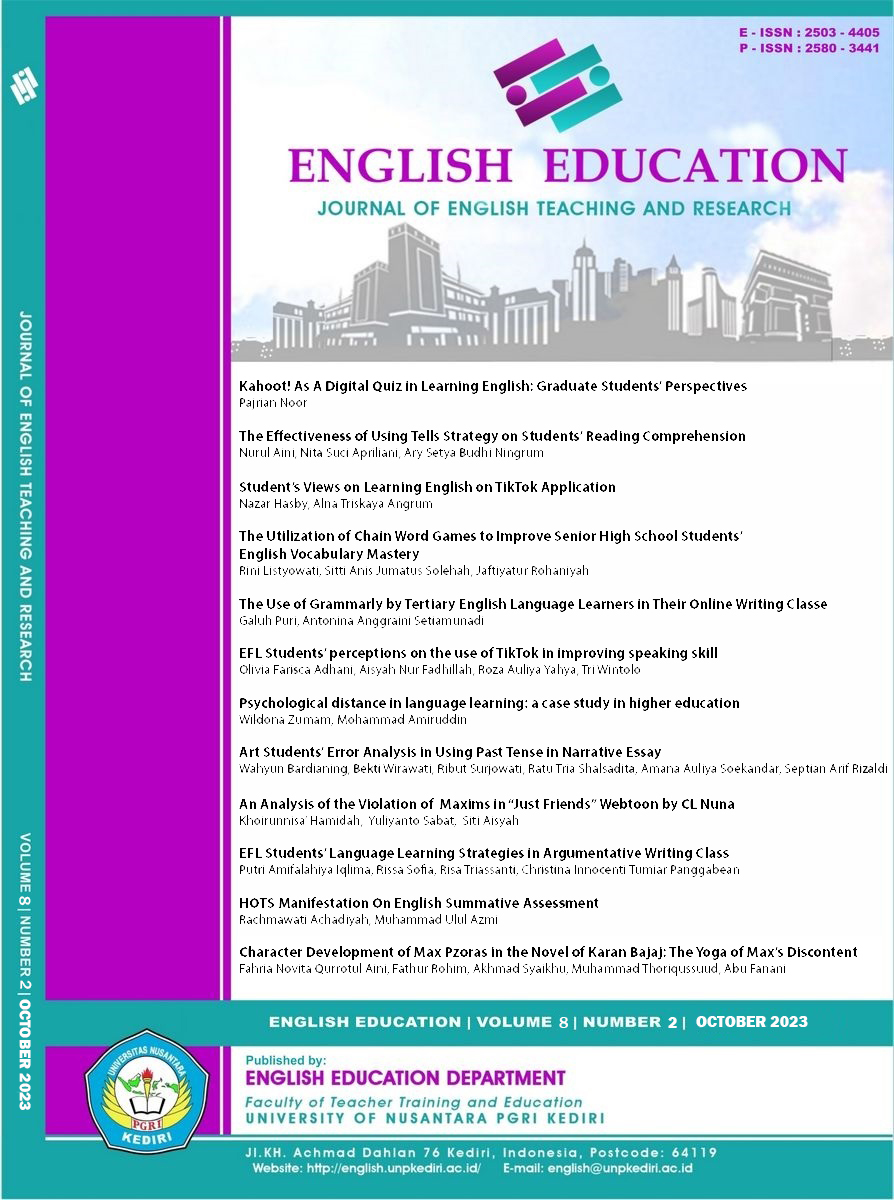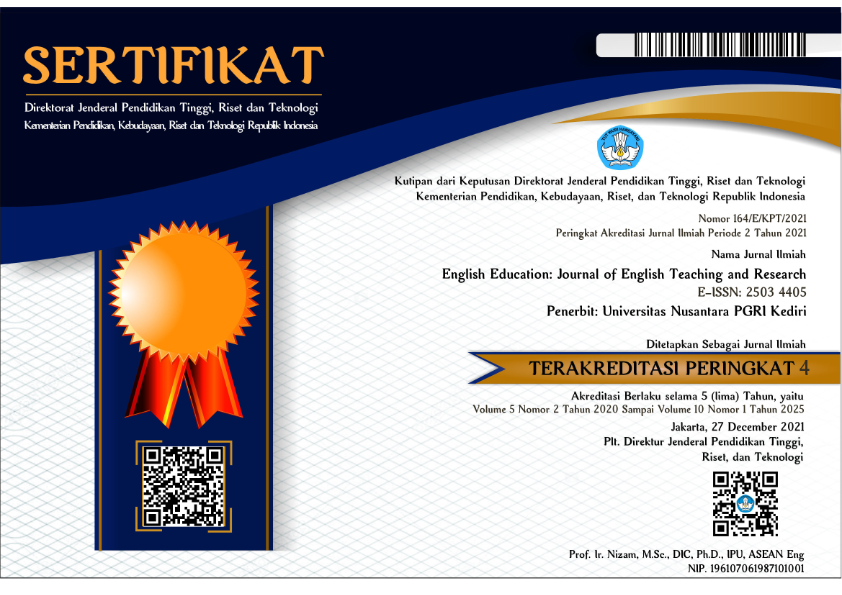The Utilization of Chain Word Games to Improve Senior High School Students’ English Vocabulary Mastery
DOI:
https://doi.org/10.29407/jetar.v8i2.19727Keywords:
Vocabulary, Word Chains Games, English LearningAbstract
Vocabulary is very important to be mastered by who are learning foreign language, especially for students at Senior High School. This research was conducted at MA Miftahul Qulub Polagan. Most of the students at MA Miftahul Qulub Polagan get difficulties in mastering English vocabulary. It was caused by the method in teaching vocabulary. So, the students felt boring and did not have motivation in learning vocabulary. Therefore, learning innovation is needed to build their motivation in learning vocabulary. This research conducted chain word games to improve students’ vocabulary mastery. The research design is classroom action research which has two cycles implementation. Test and observation were utilized to gather the data. The research performed that the students’ vocabulary mastery increased in each cycle such as in cycle 1 was 34% students who reached the comulative score and cycle II was 49% students who reached comulative score. Cycle I showed the average score of students' mastery was 67, and cycle II showed the average score 76. It can be concluded that Word Chain Game can improve students' vocabulary mastery.
Downloads
References
Dewi, N.K.A.K, Suarni, N.K, & Agung, A.A.G (2014). Application of the Cooverative Script Learning Model Through Chain Whispering Games to Improve Language Development in Children at Kindergarten Dharma Kumara Sunantaya Tabanan. Journal of Early Childhood Education Undiksha , 2(1).
Fatima, W., Khairunisa, L., Priatna, D., & Prihatminingtyas, B. (2019). Learning English Through Game Media at the Al Maun Orphanage in Ngajum Village. Information System National Seminar (SENASIF), 3(1), 1725-
1739. Retrieved from https://jurnalfti.unmer.ac.id/ index.php/senasif/article/vie w/235 .
Hudawidayanti, I.M (2016). The Use of Chain Message Game Method on Chinese Vocabulary Mastery in Class X-2 SMA Giki 2 Surabaya Academic Year 2015/2016. Mandarin Unesa, 1 (01).
Jelita, D.D., Bobi, R., & Sangadji, S.S (2020). The Work Motivation Effect of Meter Recording Employees in Drinking Water Company in Tidore City. Indonesian Journal of Agribusiness Management and Economic Sciences , 1(1), 10-14. Retrieved from http://e- journal.univnuku.ac.id/inde x.php/IJAMES/article/view/ 11
Muttaqien, F. (2017). The Use of Audio-Visual Media and Learning Activities in Improving Student Vocabulary Learning Outcomes in Class X English Subject (Quasy Experiment: SMAN 8 Garut). Journal of Scientific Insights, 8(1).
Nappu, S. (2014). Improving Students' Mastery of English Vocabulary Through Computer Assisted Language Learning. JTP- Journal of Educational Technology, 16(3), 145-156.
Putri, D. (2019). Application of the "Whispering Chain" Game Method in Improving Listening Skills in Elementary School Students. Indonesian Journal of Basic Education, 1(2), 215-219.
Rostini, S., Mugara, R., & Nafiqoh,H. (2020). Improving English Vocabulary Through Chain Message Games With Picture Media in Group B at Ra Al- Islamiyah. CERIA (Smart, Energetic, Responsive, Innovative, Adaptive), 3(4), 282- 289.
Sangadji, S. (2018). Profitability Analysis of Terubuk Farming (Saccharum Edule Hasskarl) In Subdistrict Tosa District of East Tidore of Tidore Island. Journal of Familiar Champion, 3(2),168-174. Retrieved from
http://akrabjuara.com/index. php/akrabjuara/article/view/ 204
Suprapti, D.Y, Nasirun, M.N.M, & Wembrayarli, W. (2017). Implementation of English Vocabulary Skills Through the Environment-Based Drill method. Potential Scientific Journal, 2(1), 57-62.
Suyatno, S. (2005).bFundamentals of Early Childhood Learning . Yogyakarta: Saga.
Thornbury, S. (2002). How to Teach Vocabulary. Pearson Education Limited.
Tungka, N.F (2010). English vocabulary mastery techniques in learning English. MEDIA R & D SULTENG, 3(1).
Widayanti, E.R, & Slameto,S. (2016). The Effect of Applying the Dice Game Assisted Teams Games Tournament Method to Science Learning Outcomes. Scholaria: Journal of Education and Culture, 6(3), 182-195.
Zubaidah, S. (2013). Improving Listening Ability Through Chained Whispering Games for Group A Students at Mahardhika Simokerto Kindergarten Surabaya. Teratai PAUD, 2(1).
Downloads
Published
Issue
Section
License
Authors who publish with this journal agree to the following terms:
- Copyright on any article is retained by the author(s).
- The author grants the journal, the right of first publication with the work simultaneously licensed under a Creative Commons Attribution License that allows others to share the work with an acknowledgment of the work’s authorship and initial publication in this journal.
- Authors are able to enter into separate, additional contractual arrangements for the non-exclusive distribution of the journal’s published version of the work (e.g., post it to an institutional repository or publish it in a book), with an acknowledgment of its initial publication in this journal.
- Authors are permitted and encouraged to post their work online (e.g., in institutional repositories or on their website) prior to and during the submission process, as it can lead to productive exchanges, as well as earlier and greater citation of published work.
- The article and any associated published material is distributed under the Creative Commons Attribution-ShareAlike 4.0 International License








 Article template
Article template



